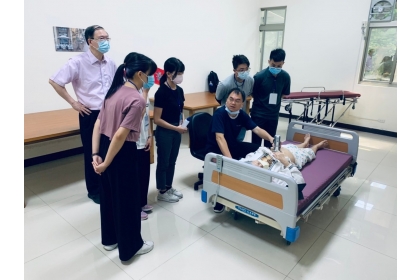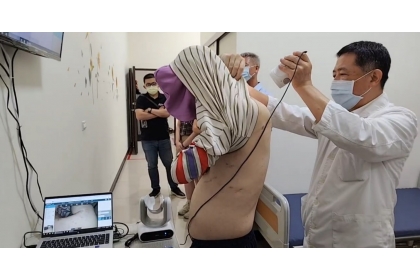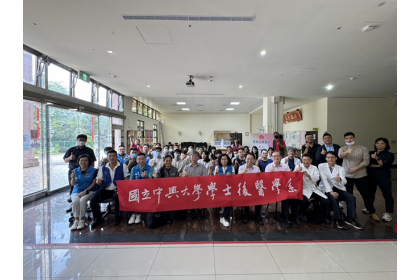NCHU Medical Students and Faculty Highlight Remote Medical Care and Advocate for Rural Communities
2024-09-09
興新聞張貼者
Unit秘書室
1,486
Source: Department of Post-Baccalaureate Medicine, NCHU
The Department of Post-Baccalaureate Medicine at National Chung Hsing University (NCHU) is dedicated to cultivating physicians with a strong sense of humanistic concern, selfless dedication to healthcare, and a solid foundation in scientific literacy. In alignment with this mission, 23 first-year medical students recently participated in a visit to Xiangfu Integrated Long-Term Care Institution in Miaoli County on September 1. This event, organized in collaboration with the Miaoli County Health Bureau and Taichung Veterans General Hospital, aimed to deepen students’ understanding of rural healthcare and inspire compassion for underserved elderly populations.
The activity, led by Dean Jeremy J.W. Chen of the NCHU College of Medicine, along with two vice deans and four senior clinical instructors, provided students with hands-on exposure to the challenges and opportunities of rural healthcare. At Xiangfu Long-Term Care Institution, four thematic stations were established, all connected to the remote care center at Taichung Veterans General Hospital via Chunghwa Telecom’s 5G network. This setup demonstrated the practical application of telemedicine, allowing local physicians in remote areas to collaborate with specialists from medical center in real time, effectively narrowing the urban-rural healthcare gap.
The stations covered key topics, including the interpretation of abdominal ultrasounds, the use of musculoskeletal and joint ultrasounds in diagnosis and treatment, telemedicine for skin conditions, and remote monitoring in nursing homes. Students also gained insight into how smart mattresses in long-term care institutions can monitor vital signs and detect residents’ bed-exit status, helping to prevent emergencies.
In addition to medical demonstrations, the event addressed the operational challenges faced by long-term care institutions, the collaborative models between rural physicians and care centers, and the essential role physicians play in these settings. Miaoli County Deputy Magistrate Lili Chiu and Health Bureau Director Chih-Wen Yang also attended, delivering speeches that highlighted the critical shortage of medical resources in rural areas. Their words underscored the urgent need for more healthcare professionals in underserved regions, striking a chord with both students and faculty.
Deputy Magistrate Chiu also spoke about Taiwan’s national healthcare vision under President Lai, emphasizing the government’s commitment to building a "Healthy Taiwan" by integrating smart technology and telemedicine to ensure high-quality healthcare reaches even the most remote areas. This mission aligns closely with the goals of the NCHU medical program, which seeks to train future physicians who are attuned to the needs of underserved populations.
The visit to Xiangfu Integrated Long-Term Care Institution provided the students not only with invaluable medical knowledge but also with a profound understanding of medical humanism. Through the collaboration of local health authorities, medical centers, and long-term care facilities, this event reinforced the importance of rural healthcare and encouraged students to take an active role in addressing the disparities in healthcare access across Taiwan.
The Department of Post-Baccalaureate Medicine at National Chung Hsing University (NCHU) is dedicated to cultivating physicians with a strong sense of humanistic concern, selfless dedication to healthcare, and a solid foundation in scientific literacy. In alignment with this mission, 23 first-year medical students recently participated in a visit to Xiangfu Integrated Long-Term Care Institution in Miaoli County on September 1. This event, organized in collaboration with the Miaoli County Health Bureau and Taichung Veterans General Hospital, aimed to deepen students’ understanding of rural healthcare and inspire compassion for underserved elderly populations.
The activity, led by Dean Jeremy J.W. Chen of the NCHU College of Medicine, along with two vice deans and four senior clinical instructors, provided students with hands-on exposure to the challenges and opportunities of rural healthcare. At Xiangfu Long-Term Care Institution, four thematic stations were established, all connected to the remote care center at Taichung Veterans General Hospital via Chunghwa Telecom’s 5G network. This setup demonstrated the practical application of telemedicine, allowing local physicians in remote areas to collaborate with specialists from medical center in real time, effectively narrowing the urban-rural healthcare gap.
The stations covered key topics, including the interpretation of abdominal ultrasounds, the use of musculoskeletal and joint ultrasounds in diagnosis and treatment, telemedicine for skin conditions, and remote monitoring in nursing homes. Students also gained insight into how smart mattresses in long-term care institutions can monitor vital signs and detect residents’ bed-exit status, helping to prevent emergencies.
In addition to medical demonstrations, the event addressed the operational challenges faced by long-term care institutions, the collaborative models between rural physicians and care centers, and the essential role physicians play in these settings. Miaoli County Deputy Magistrate Lili Chiu and Health Bureau Director Chih-Wen Yang also attended, delivering speeches that highlighted the critical shortage of medical resources in rural areas. Their words underscored the urgent need for more healthcare professionals in underserved regions, striking a chord with both students and faculty.
Deputy Magistrate Chiu also spoke about Taiwan’s national healthcare vision under President Lai, emphasizing the government’s commitment to building a "Healthy Taiwan" by integrating smart technology and telemedicine to ensure high-quality healthcare reaches even the most remote areas. This mission aligns closely with the goals of the NCHU medical program, which seeks to train future physicians who are attuned to the needs of underserved populations.
The visit to Xiangfu Integrated Long-Term Care Institution provided the students not only with invaluable medical knowledge but also with a profound understanding of medical humanism. Through the collaboration of local health authorities, medical centers, and long-term care facilities, this event reinforced the importance of rural healthcare and encouraged students to take an active role in addressing the disparities in healthcare access across Taiwan.




